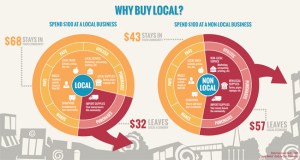Signs encouraging customers to “shop local” hang in windows of retail outlets in Astoria and throughout Clatsop County. Supporting local businesses, during the holidays and throughout the year, is important, but spending your money in your own community may do more than give you a sense of pride. According to the Civic Economics Study in Grand Rapids, Michigan, if you spend $100 at a local business, approximately $68 stays in your local economy. If you spend the same in a large business, only $43 stays in the local economy.

Spending your hard-earned dollars locally not only supports the local economy, but will also help keep funds circulating throughout the community – making it sustainable in a not-so-stable economic time.
For John Gentner, who owns Metal Head in downtown Astoria, shopping local is less of a broad ideal, and more of a personal decision. “Shopping locally is a no brainer,” he says. “Chances are that you have a buddy with a shop in town, so why not spend your dollars with them?”
With so many independent shops in Clatsop County, there is truly something for everyone. Shopping local is no longer a compromise between supporting local business owners and actually getting what you want. From custom framers, sign makers, and home design boutiques to independent butchers, herb growers and book stores, local, independent businesses are plentiful and cost-effective.

As we approach the holiday season, the importance of where money is spent becomes amplified. According to RetailMeNot’s 2017 Holiday Retail Trends and Guide, consumers plan to spend an average of $743 during the days between Black Friday and Cyber Monday, up 47% from last year’s average of $505. That doesn’t mean that shopping local is not as important every other day of the year, but holiday spending trends can make or break an independent, small business. As the nation’s economy continues to limp along, the microcosm of local community economics has become doubly significant. The “ghost towns” that no longer boast vibrant main street shops and providers are a grim warning of what can happen when dollars are spent elsewhere.
Newly minted shopping days such as Plaid Friday and Small Business Saturday are initiatives attempting to make the “shop local” mindset as prevalent as Black Friday. According to its website, “Plaid Friday is the relaxing and enjoyable alternative to the big box store Black Friday, and is designed to promote both local and independently owned businesses during the holidays.”

The Astoria Downtown Historic District Association hosts annual events in downtown Astoria. Small Business Saturday is a fairly new independent shopping day, but according to a Small Business Saturday Consumer Insights Survey, 55% of US consumers are aware of the holiday, and a staggering 83% say it inspires them to shop small throughout the year, an encouraging trend that bodes well for future projections.
Shop local initiatives also play an integral role in letting the community know of any gaps in the market. If people are consistently turning to big box stores for certain items, then it reveals a niche in which an independent maker or provider can capitalize on, benefitting the entire community.

Buying local has just as much to do with community relationships as it has to do with the economy. Spending money and time at local shops, traders, makers, and service providers inspires community engagement and allows an authentic connection between consumer and supplier. Shopping small also comes with the knowledge of knowing exactly where your product came from – you are getting a carefully made or selected product that has a person behind it.
Gentner, having lived in Astoria for the last six years, says he feels that it just makes sense. “You probably know someone who makes or grows the stuff you’re buying,” he says. “It helps your friends out financially and you get the goods straight from the source. It’s a win/win!”
















